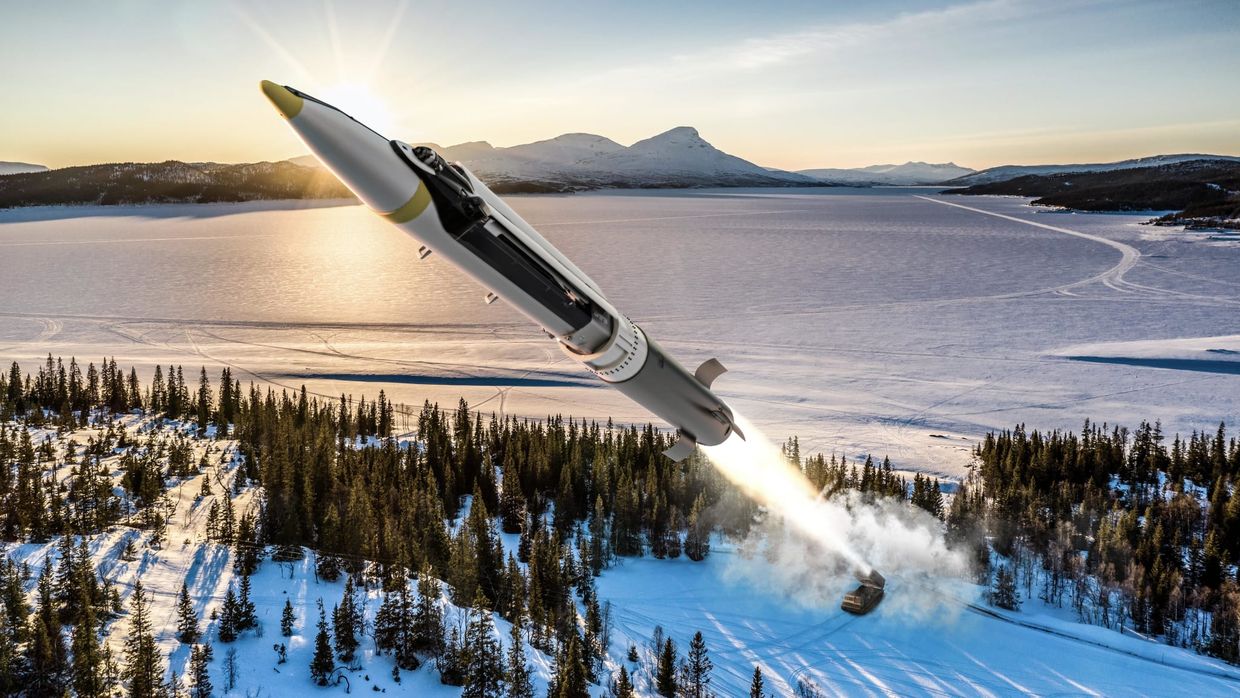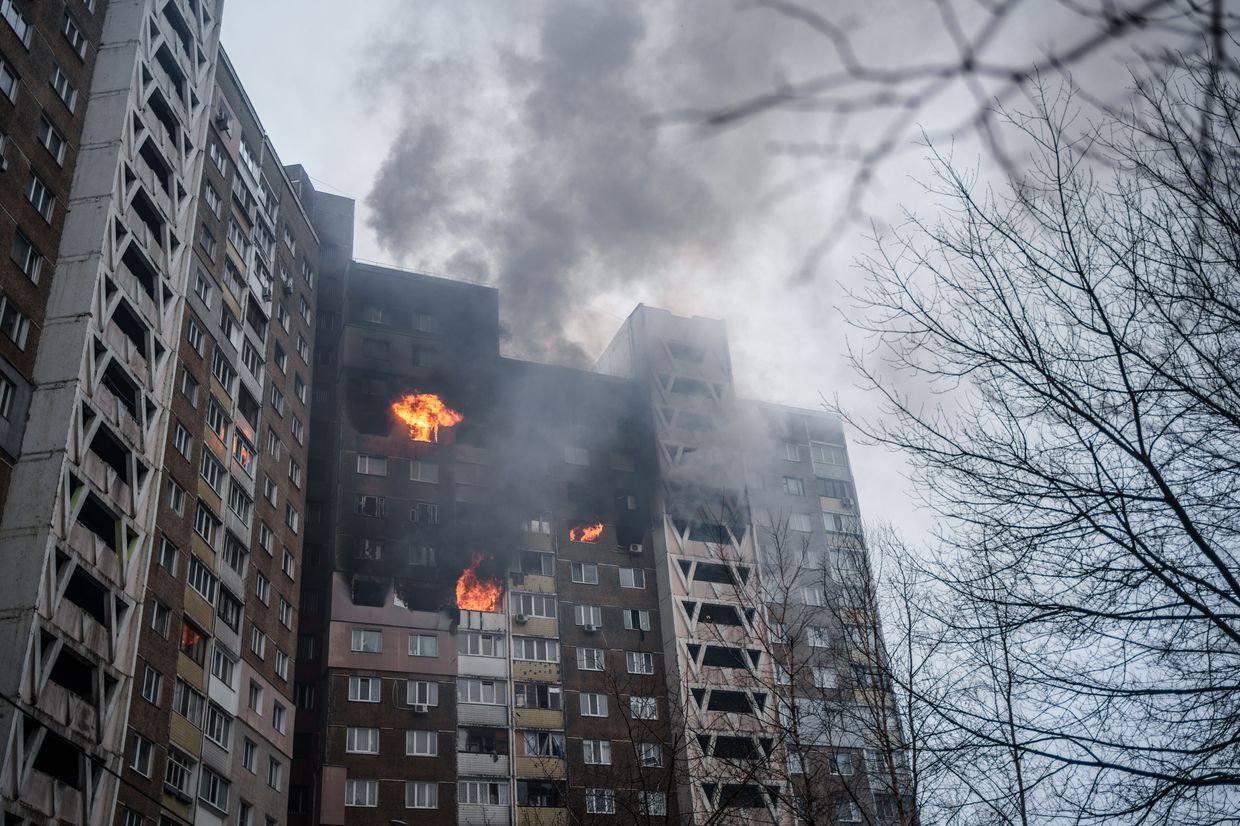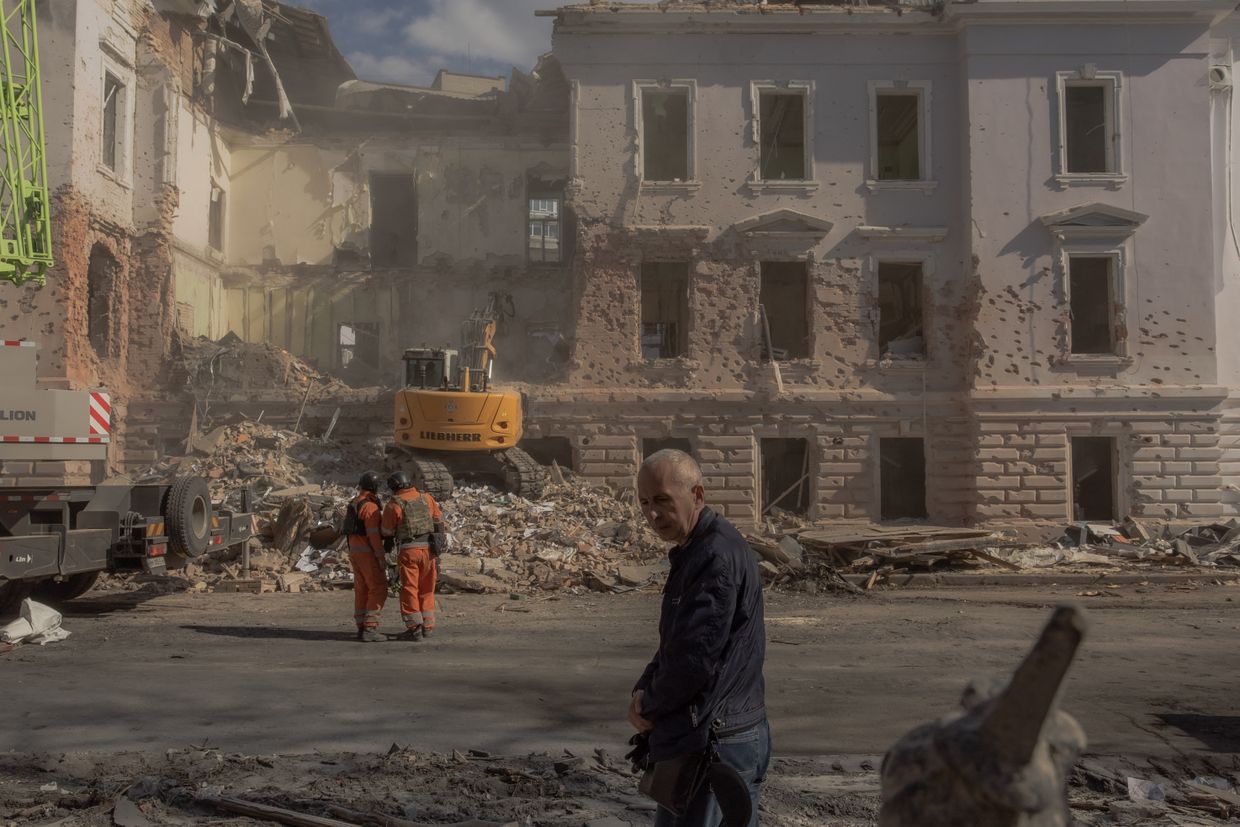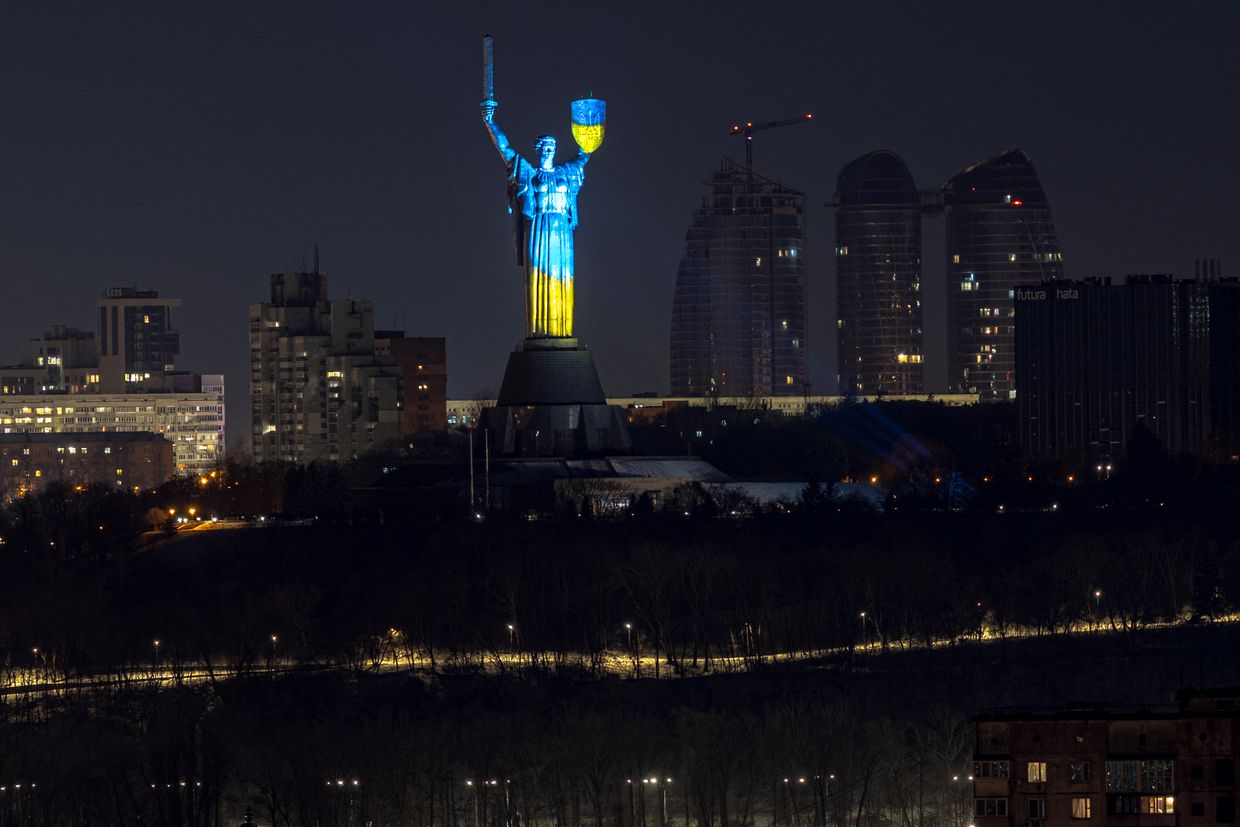Key developments on Feb. 7:
- Russia's large-scale missile, drone attack kills 5, injures 50
- Parliament passes mobilization bill in first reading
- Poll: 77% of Russians support war in Ukraine
- EU promises to deliver over 1 million shells by the end of the year
- Sweden ends investigation into Nord Stream explosion, claims lack of jurisdiction.
Russia launched another large-scale attack against Ukrainian cities early in the morning on Feb. 7, killing at least five people and injuring around 50 others. Kyiv, Lviv, Mykolaiv, Dnipropetrovsk, and Kharkiv oblasts were targeted.
Ukraine's air defense shot down almost 20 Russian missiles over the country's capital, the Kyiv city military administration reported.
In total, Ukrainian air defenses downed 44 of the 64 Russian missiles and drones launched early on Feb. 7, the Air Force reported.
According to Interior Minister Ihor Klymenko, four people were found dead in Kyiv under the rubble of the damaged high-rise building in the city's Holosiivskyi district. The 18-story building caught fire, also resulting in dozens of injured, including a pregnant woman. Some 60 residents of the building were evacuated.
The attack also damaged two power lines in Kyiv, leaving 19,400 consumers and healthcare facilities without electricity.
The Kyiv Oblast Military Administration reported that the attack damaged dozens of houses, several apartment buildings, a cultural center, an educational institution, a post office, and vehicles in the region. Three people were recorded injured in Kyiv Oblast as of 6 p.m., the regional authorities said.
Several explosions were also heard in Drohobych in Lviv Oblast, located some 77 kilometers south of Lviv. There were no reports of casualties in the city.
Local authorities later reported that an industrial facility in Drohobych caught fire, which was promptly put out by emergency services.
Kharkiv Oblast Governor Oleh Syniehubov reported that Russian forces struck Kharkiv at least four times at around 6 a.m. local time.
According to the governor, the attack targeted the Slobidskyi district of the city, damaging a building of a local company.
Three of the company's employees, including two men aged 59 and 64 and a 52-year-old woman, were injured, prosecutors reported.
Two of the five missiles Russia launched at Kharkiv were made in North Korea, according to Serhii Bolvinov, the head of the investigative department of the Kharkiv Oblast police.
Mykolaiv Oblast was attacked both by air-launched missiles and Shahed-type drones. Around 40 residential buildings were damaged in Mykolaiv, officials said.
Mayor Oleksandr Senkevych reported that one man, later identified as an employee of Naftogaz's Gas Networks, died as a result of the attack.
The State Emergency Service and the Interior Ministry said that six people had been confirmed as injured in Mykolaiv.
In Dnipropetrovsk Oblast, Ukrainian defenses shot down two Shahed "kamikaze" drones, Governor Serhii Lysak said. The buildings and cars of a utility company were damaged by drones and falling debris.
A fire broke out but was quickly extinguished by emergency services. No casualties were reported in the oblast.
This was not the first attack of such scale during this winter. Russia carried out a number of massive attacks in the past weeks and months, most notably on Dec. 29, Jan. 2, and Jan. 23.
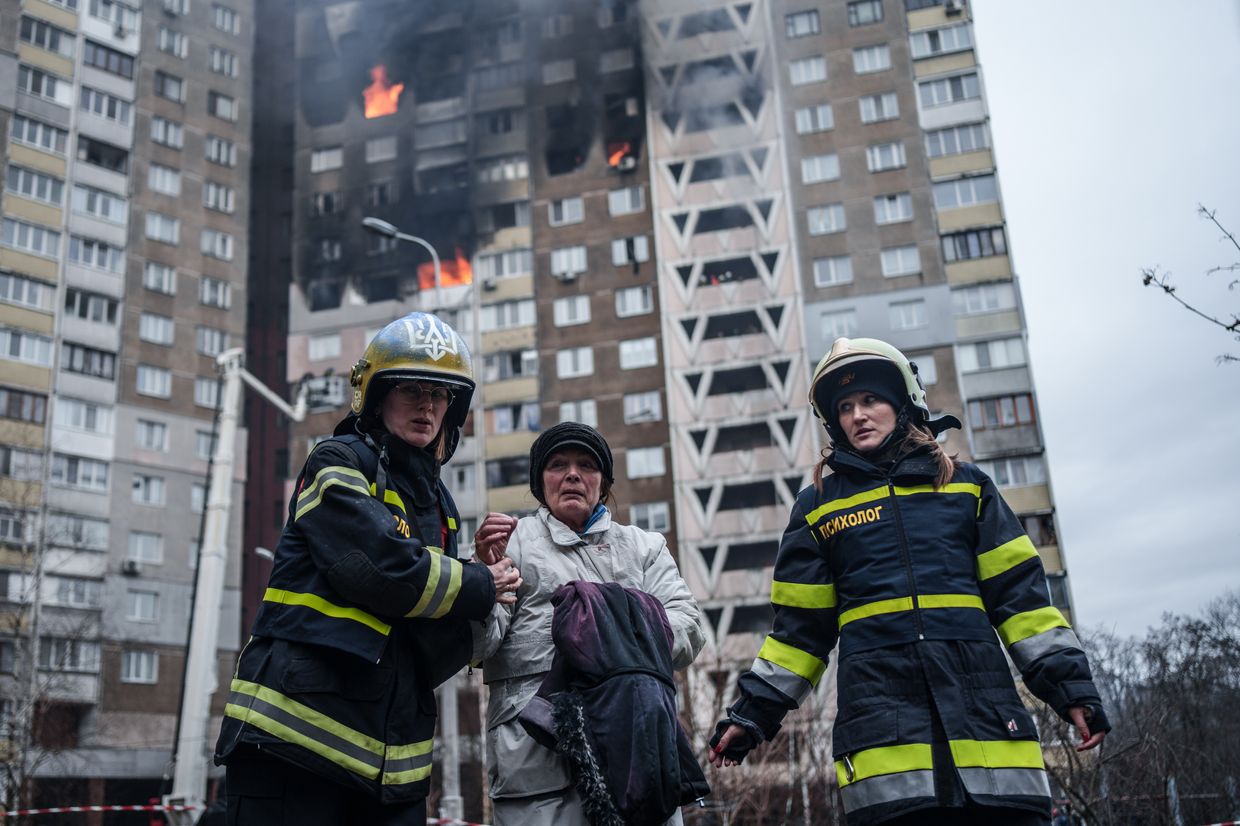
Parliament passes mobilization bill in first reading
Ukraine's parliament, the Verkhovna Rada, voted in support of the updated bill on mobilization in the first reading on Feb. 7.
Ukraine's government hopes to update the legal framework around conscription in order to ramp up mobilization in 2024. To become law, bills must be passed by parliament in two readings and signed by the president.
The government submitted a new draft of the mobilization law to parliament on Jan. 30, more than two weeks after withdrawing its initial, contentious version.
The first version proposed, among other things, to restrict the rights of those who evade military registration and service. Such restrictions included a ban on traveling abroad and making transactions with movable and immovable property.
The updated bill sets out "transparent rules for the mobilization process, as well as necessary regulation of the rights of military personnel and conscripts."
The bill also specifies clear terms of service for the period of martial law, service exemption for people with all levels of disability, as well as a two-month reprieve for volunteers before the start of service to "resolve personal issues and prepare for mobilization."
Regarding military training, newly mobilized recruits will undergo mandatory military training for two to three months, according to the bill.
The bill also proposes to abolish mandatory conscription for all citizens aged 18-24 and instead introduce five-month military training. Citizens can choose when to undergo this training.
Chief Ombudsman Dmytro Lubinets said on Feb. 6 that the revised draft law on mobilization still contains provisions that violate Ukraine's Constitution.
However, he then had an "urgent meeting" with Defense Minister Rustem Umerov and said he concluded the draft law should be adopted.

Poll: 77% of Russians support war in Ukraine
A recent poll from the Russian independent polling organization, the Levada Center, found that 77% of Russians support the full-scale war against Ukraine, with only 16% of respondents saying they were opposed to the war.
The figures have stayed remarkably consistent throughout the war, polling data has shown. A poll released in November 2023 found that 75% of respondents supported the war.
An overwhelming majority (77%) believe Russia will ultimately be victorious in the war, a 6% increase from January 2023.
At the same time, more than 50% of respondents said they favored peace talks, a figure that has declined slightly over recent months.
Around 66% of respondents also believed that "Russia is paying too high of a price for participating in the war," down from 82% who agreed with the statement in July 2023.
Only 31% of those polled said they bore moral responsibility for civilian deaths and destruction in Ukraine.
A minority of respondents (22%) said that starting the full-scale war in Ukraine was a mistake, a decrease from a high of 28% in September 2023.

EU promises to deliver over 1 million shells by the end of the year
The EU aims to deliver over 1 million shells to Ukraine by the end of 2024, Prime Minister Denys Shmyhal said after meeting the EU's top diplomat, Josep Borrell, in Kyiv on Feb. 7.
Borrell recently conceded that the European bloc will fail on its promise to provide a million artillery rounds by March. Only around half of the number is projected to be delivered by the original deadline.
"We highly appreciate the EU's military assistance," said Shmyhal, who held a joint press conference with Borrell.
"The European defense industry is building up its capabilities, and I'm sure we'll feel it soon."
Speaking at the press conference, Borrell reportedly said that "by the end of the year, the total amount of ammunition delivered as donations will be about 1,155,000."
Shmyhal welcomed the European Commission's decision to extend the free trade agreement with Ukraine until June 2025. The regulation, which was implemented in 2022, sparked a number of trade disputes with Ukraine's neighbors, namely Poland.
Ukraine's head of government added that Kyiv wants to fix the free trade regime as part of the country's association agreement with the EU.
According to Shmyhal, the two officials also discussed the confiscation of Russian assets frozen in European accounts. The EU has been reluctant to seize the assets so far but has supported a plan to fund Ukraine with profits generated by the frozen funds.
Borrell arrived in Kyiv on Feb. 6 in a gesture of the EU's continued commitment to Ukraine as it faces Russian aggression. European assistance is ever more crucial now as support from the U.S. remains stalled by domestic political disputes.
The EU representative had to spend hours in a shelter earlier on Feb. 7 as Russia launched a massive strike against Ukrainian cities, including Kyiv.
Before his meeting with Shmyhal, Borrell also addressed Ukraine's parliament and held a meeting with Parliament Chairman Ruslan Stefanchuk.

Sweden ends investigation into Nord Stream explosion, claims lack of jurisdiction
Sweden's Prosecution Authority announced on Feb. 7 that the country's investigation into the explosion and subsequent damage to the Nord Stream pipelines has concluded because Sweden does not have the appropriate jurisdiction.
The Nord Stream underwater pipelines connecting Russia to Germany were blown up in September 2022. Investigations have been ongoing since then but have yet to produce a definitive conclusion regarding the source of the explosions.
In the aftermath of the explosions, several Western officials referred to the pipe leaks as "deliberate acts of sabotage" but could not unequivocally verify that the damage was linked to Russian involvement.
Denmark confirmed in April 2023 that a Russian SS-750 vessel was photographed close to the location of the sabotaged Nord Steam pipelines.
U.K. intelligence sources told the Times newspaper shortly after the explosions that Russia was allegedly behind the attack.
Sweden's Prosecution Authority said the primary purpose of their investigation was to determine "whether Swedish citizens were involved in the act and whether Swedish territory was used to carry out the act, and thereby risked damaging Swedish interests or Sweden's security."
After finding that there was no connection to Sweden or Swedish citizens, and that the explosions occurred in international waters, the prosecutors ruled there was no reason to continue the investigation.
While Sweden's case is now closed, German and Danish investigations are still ongoing.
Some German investigators have linked the explosions to Ukraine, accusing a crew of Ukrainians of carrying out the sabotage, but did not say whether it was officially authorized by Kyiv. Ukraine has denied any involvement.
Sources with knowledge of the German investigation told the Wall Street Journal (WSJ) in January 2024 that they believe the attack was launched from Poland and said that the Polish government has been hesitant to provide information to investigators and withheld other evidence.
The sources also acknowledged that there was no concrete evidence connecting the Polish government or officials to the explosions but said that the perceived hesitance of Polish authorities to cooperate with the investigation was a source of suspicion.
